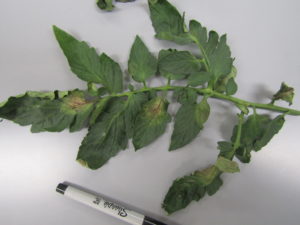Late Blight on Tomato Confirmed in Haywood County, NC (Aug 26, 2019)
go.ncsu.edu/readext?619581
en Español / em Português
El inglés es el idioma de control de esta página. En la medida en que haya algún conflicto entre la traducción al inglés y la traducción, el inglés prevalece.
Al hacer clic en el enlace de traducción se activa un servicio de traducción gratuito para convertir la página al español. Al igual que con cualquier traducción por Internet, la conversión no es sensible al contexto y puede que no traduzca el texto en su significado original. NC State Extension no garantiza la exactitud del texto traducido. Por favor, tenga en cuenta que algunas aplicaciones y/o servicios pueden no funcionar como se espera cuando se traducen.
Português
Inglês é o idioma de controle desta página. Na medida que haja algum conflito entre o texto original em Inglês e a tradução, o Inglês prevalece.
Ao clicar no link de tradução, um serviço gratuito de tradução será ativado para converter a página para o Português. Como em qualquer tradução pela internet, a conversão não é sensivel ao contexto e pode não ocorrer a tradução para o significado orginal. O serviço de Extensão da Carolina do Norte (NC State Extension) não garante a exatidão do texto traduzido. Por favor, observe que algumas funções ou serviços podem não funcionar como esperado após a tradução.
English
English is the controlling language of this page. To the extent there is any conflict between the English text and the translation, English controls.
Clicking on the translation link activates a free translation service to convert the page to Spanish. As with any Internet translation, the conversion is not context-sensitive and may not translate the text to its original meaning. NC State Extension does not guarantee the accuracy of the translated text. Please note that some applications and/or services may not function as expected when translated.
Collapse ▲Late blight on tomato was confirmed in Haywood County on August 26, 2019, and confirmed by microscopic observation of the sporangia under the compound microscope. Samples will be sent to Cornell for genotyping and sensitivity to mefanoxam. An update will follow.
UPDATE (Oct. 7, 2019): Late blight has been confirmed in Henderson County as of Oct. 4, 2019. Genotyping information to follow.
UPDATE (Sept. 3, 2019): This strain is US-23 which is known to be sensitive to mefenoxam, the active ingredient in Ridomil.
Growers should monitor frequently for symptoms of late blight and begin applying systemic fungicides. Tomato and potato are extremely susceptible to this disease and can be significantly defoliated within days if environmental conditions are conducive. Heavy morning dews and cool, wet weather favor this disease. Active scouting and preventive fungicide applications to protect tomato crops in NC from late blight is recommended.
For more information about late blight and how to manage it, see the tomato late blight fact sheet, which lists effective products against late blight. Control recommendations are also available in the USAblight website, where you can register to receive text and/or email alerts when new disease outbreaks are reported.
If you think you have late blight in your tomatoes, please contact your local Extension Agent and send photos and/or physical samples to the NC State University Plant Disease and Insect Clinic. If late blight is confirmed in your samples by an expert, please submit a report to the USAblight website to alert other growers. The USAblight website also contains information about disease identification and control.



